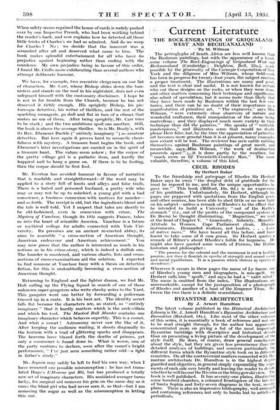CECIL RHODES By Herbert Baker
To the friendship and patropage Of Rhodes Sir Herbert Baker says he owes " the deepest debt of gratitude for the trust he reposed in me, and for the unique opportunities he gave me." This -book (Milford, 10s. 6d.) is an expression of his gratitude. Unfortunately, Sir Herbert, although his pages are peppered with quotations from the English poets and other sources, has been able to shed little or no new light on his subject—unless a remark of Rhodes's to the effect that he intended to build a University "out of the Kaffir's stomach" (i.e., out of the profits of the compound system at De Beers) be thought illuminating. "Magnetism," we read at the head of Chapter V. "Generosity. Sobriety. Morality. Attitude to Women. Cape Parliament clean. Human instruments. Demanded workers, not loafers. . . . Love of native races." We have heard all this before, and have learnt to take some of it. cunt grano. Sir Herbert quotes a remark of Milner's about Rhodes's foible for largeness. He might also have quoted some words of Ferrero, the Italian historian and philosopher : "The passion for the colossal and the en-ormous- is not* healthy passion, nor does it flourish in epochs of strength and sound moral and social equilibrium. at is a passiOn which thriv.es 41 epochs of decadence.
Wherever it occurs in these pages the name of Le Sueur, one of Rhodes's young men and biographers, is mis-spelt. Sir Herbert calls him " spoilt,"_and says he had a " valet mind." The name is omitted froni.the- index;'- The illustrations are unremarkable, except for the- juxtaposition of a photograph of Rhodes and another ot a_bust of the. Emperor Titus. Be- tween the two there is a definite resemblance.
















































 Previous page
Previous page